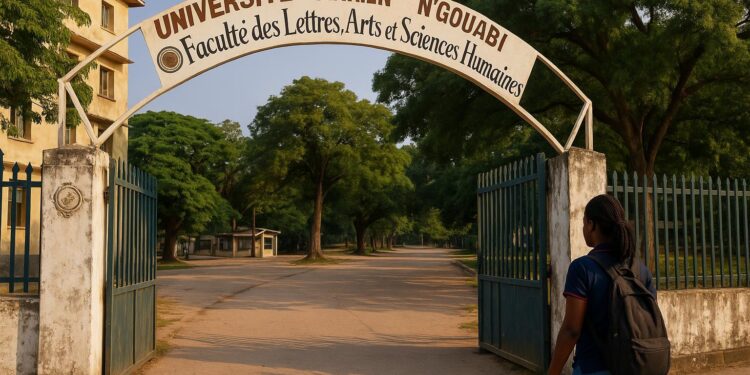Fee Adjustment Ignites Campus Discourse
On the leafy plateau overlooking the Congo River, Brazzaville’s sole public university, Marien-Ngouabi, has become the focus of an intense conversation after tuition adjustments were announced in July. The revised schedule doubles or, at doctoral level, nearly triples enrolment fees for the institution’s 45,000 students this academic year.
The administration frames the measure as consolidation rather than augmentation, noting that disparate charges for student cards, transcripts and graduation certificates are now bundled. Officials insist the aggregate cost remains aligned with regional norms and will enhance transparency, planning and the university’s ability to attract external partnerships sustainably.
Fiscal Priorities Behind the Policy Shift
National authorities highlight that public universities have absorbed inflationary pressures for over a decade while public finances weathered oil-price volatility, the pandemic and major infrastructure programmes. The finance ministry recently underscored that higher-education allocations already consume close to seven percent of the national budget, surpassing regional peers averages.
For policymakers, cost-sharing is viewed as a pragmatic instrument to maintain lecture halls, laboratories and digital networks without jeopardising macroeconomic stability. A senior official from the higher-education portfolio emphasised that fees remain far below those in neighbouring Gabon or Cameroon, where public grants are comparatively smaller for learners.
Government spokespersons also cite the African Union’s 2063 agenda, which encourages domestic resource mobilisation to strengthen research capacity. Brazzaville’s roadmap envisions new science clusters in energy engineering and tropical medicine; predictable internal funding is portrayed as a precondition for seeding collaborations with Chinese, European and multilateral sponsors ahead.
Students and Professors Voice Cautious Concerns
Within dormitories once animated by late-night debates, many learners voice apprehension. They acknowledge the bundling logic yet question timing, noting delayed scholarship disbursements and broader cost-of-living pressures. “We understand sustainability, but our parents’ salaries have not doubled,” said literature undergraduate Arielle Mabiala during an impromptu campus meeting yesterday.
Student associations, while traditionally fragmented, are quietly consulting legal texts to verify procedural conformity. Several leaders recall 2019, when fee debates triggered calendar disruptions and protracted negotiations. Observers suggest that, should protest escalate, the cabinet may appoint a mediation committee similar to panels deployed after the 2020 fire.
Faculty members strike a diplomatic note. Some praise the prospect of increased laboratory maintenance budgets, yet they also underline the importance of inclusivity. “Retention indices correlate with affordability,” explained economist Professor Jean-Claude Mabiala, adding that exemptions for orphans and displaced students could prevent talent leakage to private institutes.
Comparative Metrics and Development Agendas
Analysts in Abidjan and Nairobi observe that Congolese tuition, even after adjustment, remains below the West African Economic and Monetary Union median of 30,000 CFA for undergraduate programmes. Nevertheless, they caution that purchasing-power disparities between urban civil servants and rural families complicate cross-country comparisons and policy benchmarking exercises.
International financial institutions have long encouraged diversification beyond hydrocarbon receipts. In a recent country brief, the World Bank highlighted human-capital investment as a leading indicator for productivity gains. Marien-Ngouabi’s restructuring is therefore interpreted by several multilateral economists as an incremental but welcome step toward domestic co-financing of education.
At the same time, UNESCO statistics reveal that only twenty percent of Congolese aged eighteen to twenty-four access tertiary studies, compared with forty-three percent globally. Achieving the African Union’s inclusivity targets would thus require parallel actions, including scholarship digitisation, internship pipelines and progressive rural broadband expansion strategies nationwide.
International Stakeholders Monitor the Classroom
Foreign embassies follow developments closely because Marien-Ngouabi alumni populate ministries and regional organisations. A French cultural attaché noted that predictable tuition schedules facilitate bilateral exchange programmes and Fulbright-style grants. Conversely, prolonged unrest could deter visiting lecturers scheduled under an EU-funded governance project set to commence in November 2023.
Chinese representatives, managing substantial infrastructure portfolios, privately welcome signals of cost-sharing, viewing them as evidence of domestic commitment. They nonetheless express interest in safeguards ensuring that engineering enrollees, vital for future special economic zones, are not priced out. Discussions reportedly include partial stipends tied to Mandarin language proficiency.
Regional blocs such as ECCAS could leverage the episode to deepen academic portability. Negotiations around mutual recognition of credits are advancing, according to the Central African Bank for Economic Integration. Harmonised tuition structures, proponents argue, would amplify student mobility and anchor what diplomats term ‘human integration corridors’ soon.
Prospects for Consensus
University authorities have scheduled a stakeholder forum for early October, inviting student unions, parent associations, donor agencies and parliamentarians. Rector Clément Mouamba says the event will produce a transparent cost matrix and a phased payment calendar. Analysts describe the move as a confidence-building step consistent with good-governance norms.
Whether the forthcoming dialogue diffuses tension or catalyses broader reforms will shape Congo-Brazzaville’s ambition to position education as a pillar of national emergence. For now, the tone on campus oscillates between guarded optimism and routine scepticism, yet the channels for peaceful negotiation remain open and institutionally endorsed today.












































